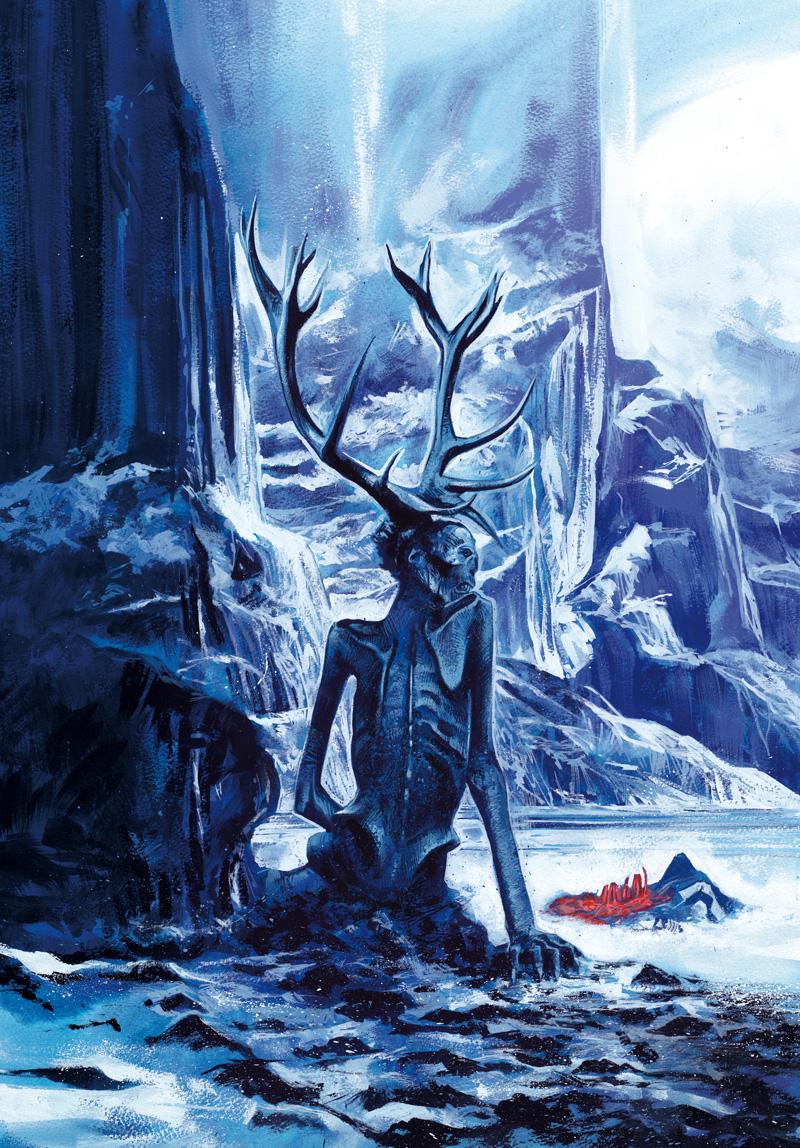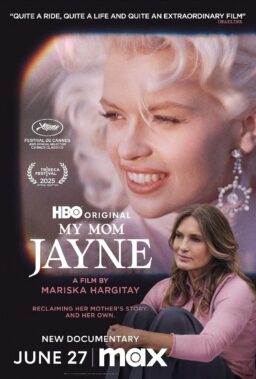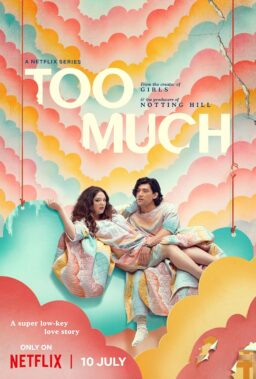Indie horror icon Larry Fessenden is an American original. As a filmmaker, Fessenden’s movies often concern American exceptionalism, and a general sense of foreboding about our culture’s unexamined prejudices. But Fessenden even stands apart from contemporaries like Eli Roth, another horror-master whose work focuses on Americans’ regrettable lack of self-awareness. With abundant gallows humor and an inviting fascination with mythic iconography, Fessenden makes movies that don’t conclude with the end of the world as we know it, but rather suggest a more ambiguous, semi-optimistic post-human future. This is true of Fessenden-helmed films like “Wendigo,” “The Last Winter,” and “Skin and Bones,” Fessenden’s excellent contribution to the short-lived “Fear Itself” television anthology. Fessenden continues that focus with “Sudden Storm: A Wendigo Reader,” a new book of essays edited by Fessenden and written by horror experts about Native American folklore, and the depiction of cannibalism and environmental portents in the media. RogerEbert.com spoke to Fessenden about Wendigos, Donald Trump, “Funny Games” and more.
When we last spoke in 2010, you talked about “American exceptionalism” as being part of what makes your films uniquely American. In light of that thematic focus: what would you say are some of the distinguishing characteristics of the wendigo narrative?
Americans think we’re exceptional, but we’re not. As we become a stupider nation in our discourse, there has become more posturing and chest-thumping. The “wendigo” fits in as it is concerned with a kind of American expansionism that’s been going on since we first touched this country’s shores, taking over native population’s land, giving them diseased blankets, and generally having our way with them. As if we had a right to this land. The myth of the wendigo comes from the Canadian, Northern Algonquin tribes. What I find intriguing about that story is how it can be applied to expansionism: taking over the land, and also taking over other people. To me, wendigo mythology has great resonance, whether it’s a cannibal story, or a much broader comment on western culture destroying native people, and the environment. Which is where we are now. Global warming is the final frontier of wendigo-ism! [Laughs]
Cannibalism is often seemingly used in horror films as a sort of revenge against capitalism, or just financial inequality. Like zombie movies, there’s a built-in class warfare element to it, though it often devolves into a war of all against all. What is unique about the wendigo and the fears we project onto it?
Well, cannibals seem to really freak people out. [Both laugh] Because it is about eating another person. I’ve never had the same reverence for humanity that most people do. I don’t eat animals either, except fish. So to say you could never eat human flesh … I see it all with a bit of irony, as an expression of narcissistic anxiety! Anyway, the wendigo is a fundamentally cautionary tale about not eating your fellow traveler in times of extreme duress, like if you were stuck in a winter storm. And extrapolating from that, the wendigo is a caution against over-reach, and rapaciousness.

It’s a corrective.
Exactly. And I think that’s how it was used in Native American cultures. Another thing that some of the authors in “Sudden Storm” discuss: there’s a very real condition called “Wendigo Psychosis.” And that’s a description of actual madness, not just a fear of something. It’s the fear that you’ll become possessed by the spirit of the wendigo. These people would become unhinged, and try to eat their families, in the way that you do when you’re unhinged. [Laughs] There are all of these intangible elements with the wendigo, whereas with werewolves it’s a much more clear description of a man/beast dichotomy. With Frankenstein’s monster, we understand that to be science run amuck. With the wendigo, it’s a little harder to grasp.
I mentioned cannibals and zombies because they’re the closest commonly-used analogue to the wendigo that we have in horror cinema. But the wendigo is, as you said, different from a cannibal in that the wendigo is based on folklore, and is therefore often an avatar of the environment. Talk a little about how you use the wendigo as a symbol of either environmental apocalypse or rejuvenation in your films.
Even that’s unclear. There’s only one mention of the wendigo in my movie “The Last Winter.” But you can see the creatures at the end of the film as some sort of nature spirit. A lot of people tended to see that as nature’s revenge, but I think of it differently: nature simply is. It’s the people’s sense of dread that overcomes them, and it is almost like a parable about guilt. When the world falls out of balance as it has, there is hell to pay. The wendigo is a way to discuss that. It’s manifested in different ways. Sometimes it’s a creature with antlers, and sometimes it’s something in the wind. In my film “Wendigo,” I have the creature appear as a bunch of sticks and branches. But in my movies, I always try to get at the fact that all of this is in the mind. And if your mind is troubled by what you’ve done, or by real, scary elements in your life, then maybe the wendigo will visit you.
In your introduction to “Sudden Storm,” you mention your first childhood introduction to the wendigo. Was that also the moment where it became an obsession of yours? Or maybe it was the time your mother frightened you by growling “wendigo” from the kitchen corner? Was there a later event that really turned a trauma into something you just couldn’t let go of?
I can’t think of any one incident. I came from a comfortable upbringing, no real trauma. But I think if you’re a very creative, sensitive kid, you’re aware—or I was aware—that this is a very fragile reality, and that it can disappear at any moment. I certainly could envision the dark possibilities in every moment. I was the third child, so it’s possible that my mother didn’t show me enough attention or something like that, really all subtle things that one could imagine. But the bottom line was that I was always oriented towards the horrific. I would read scary comics all day long, and would be terrified at night. It shows a sense of perversion that I never corrected that situation. And that’s what we do at Glass Eye Pix, [the Fessenden-founded indie horror production company.] The common misconception is that people who make scary movies are above it all. But I feel exactly the opposite. I always say that I’m afraid of everything and I want audiences to see the world like I do.
Look at Hitchcock: He was clearly terrified by the world at large, and wanted to torture other people. Well, I’m of that school.
As for the wendigo: that was a childhood story told by a teacher in second grade at story hour, and it became an image that stuck in my mind. It was very evocative. I told my mother about it, and she proceeded to hide in the kitchen closet and scare me. Anyway, the wendigo story really stuck in my craw. When I went to Hollywood, after making “Habit,” I pitched them something other than a horror movie. They said “Well, we really want a horror film from you. That’s what you do, isn’t it?” So I went and wrote the script for “Wendigo.” I had this strange reserve in my mind, a latent memory about this creature that had haunted me as a kid. I wanted to convey that to others. I have been obsessed with death for all of my 52 years, which is an interesting way to go through life. Once you’ve made it to 52 years, you realize you’ve wasted all that time worrying. [Laughs] And it will come anyway. The question is always when … and how.

Let’s go back for a moment: how does race play into mythology of cannibals? In your films “Wendigo,” and “The Last Winter,” as well as “Skin and Bones,” your episode of “Fear Itself,” you deal with this notion of appropriation and how white Americans are punished for what they probably see as a relatively benign kind of assimilation. How did you imagine dealing with that notion of privilege and manifest destiny?
Privilege is an important issue to address. Americans are so smug that they imagine that they are somehow entitled. You see this in public discourse; it’s incredibly discouraging. The presidential race is filled with pompous blowhards who are not really addressing the essential violence of industrialized societies. I love my technology as much as the next guy. But I just feel, philosophically, there needs to be a correction. Now at the same time, I am also part of this culture; I always try to give my villains humanity, because there’s a appealing characteristic in the adventurer, the explorer, and the exploiter. That’s why I cast Ron Perlman in “The Last Winter”: he’s the oil man, and he serves as the villain. But he’s robust and exciting. So I hope there’s contradictions in my movies. Just like Donald Trump has a certain appeal but at the same time he is toxic.
The basic assumptions we are living by are not sustainable. That’s a very cliched term in the environmental movement, but it’s an essential truth. What’s going to bring about our end is pursuing this fantasy of perpetual growth that stems from a disconnect from reality based on an arrogance about our own self-importance. Meanwhile, we’re destroying the poor classes, enslaving people. Maybe not literally, but it’s basically the same thing: Mexicans work in our slaughterhouses, pick our fruits and yet, we disparage them as lazy. It’s absurd. These people are the basis of our exploitive economy. Call me “bleeding heart,” if you will—emphasis on “bleeding.”
Now, is there an alternative? Yes, there is. There is such a thing as a more modest, measured society. How we can ever get back to that is a complete mystery in this culture. However, if you can’t even have that conversation, you’ll never get there. I’d like to think that that conversation has to start with some wake-up calls. And why not bring in some horror pictures to do that? That’s always been my orientation. I’m compelled to depict the dark side of Western civilization. I really think humanity is a virus, as I say in “The Last Winter.”

Since horror movies have that cathartic element, a lot of the genre’s milestones deal explicitly with taboos. Do you feel horror filmmakers have to be responsible in how they say or deal with certain issues? Like with “The Green Inferno”: some people say it’s not enough that Roth is inspired by films like “Cannibal Holocaust,” but rather feel they have to take it out of the context of his influences, his subject, his genre, etc.: it’s the power of the image that they worry about. Is that a fair critique for a horror film?
It seems crazy to make politically-correct horror movies. So while I can’t really trust Eli’s taste, I think he has a right to use shocking images to make his point, if he has one. I wasn’t a fan of his first film [“Cabin Fever”], and I was asked to sort of confront him in the press about it. I had made “The Last Winter,” at the time, so it was assumed that we were coming from different places. I thought “Cabin Fever” was a silly movie. But before I went and spoke any further in confronting him in the press, I watched the “Hostel” films. And I enjoyed them. I felt like he was poking fun at American exceptionalism. The characters are buffoons! They go to Europe and expect to have their way. But things don’t go well, there’s some comeuppance there, which I think is pleasing in a horror film. I haven’t seen “Green Inferno,” but I don’t assume it’s bad. It may well be offensive, but maybe it’s getting at something.
Is there a line that you feel a horror filmmaker cannot cross?
There’s certainly no decree that I would make. However, as I get older, I’m less inclined to just watch appalling things unless there’s a point to it. Extremely violent movies—that’s just not my scene. I’ve never really made it through “Inside;” I’ve only seen part of it. And I take issue with “Funny Games,” Michael Haneke’s “masterpiece.” I find it rude his presumption that I go to horror films to see people tortured. That’s not my motivation, and that’s what [Haneke] is accusing me of when he breaks the fourth wall in that film. So I find that pretentious, but what I do find effective in that movie is the cinematic brutality, and the cold-blooded murder of a child in front of its parents. That I find profound, and that kind of violence is 100% valid when it’s done in “Henry: Portrait of a Serial Killer.” Because there, the filmmakers are making a comment on this sub-culture of people in our society who are disconnected and very scary. That I find fascinating. It’s not like “Friday the 13th” and all those films, which I think are silly. A lot of people love those films, but I never liked horror for horror’s sake unless it’s in the atmosphere. So maybe I mean violence for violence sake.
Other movies that almost cross a line? I love “Man Bites Dog.” That’s technically a satire, but it’s incredibly brutal while also making a comment on horror, and violence, and the self-importance of the filmmakers. I love “Irreversible” … we’re talking about difficult movies to watch now. And my favorite movie of this extreme nature is “Angst.” They just re-released it on Blu-ray. It’s gorgeous, absolutely compelling, and shocking, unblinkered horror. That film could easily be said to cross the line: sex with corpses, horror, mutilation. And yet, the movie feels like it’s looking for truth, so it works for me.
As you get older, all violence is sad. And you get tired of it, because it doesn’t stop. Look at ISIS: I always say they’re making the best horror movies out there. There’s too much media, and in the end, you just want to retreat. It’s hard to continue to be confrontational, and persevere as if you’re going to make a difference. I feel exhausted with humanity.
If you could recommend one Wendigo narrative that you think a lot about, or one you think is especially emblematic, which one would it be?
I would start with Algernon Blackwood’s “The Wendigo.” It’s a very quick read, but it depicts an unknowable dread, where you don’t recognize people you thought you knew. Where the wind is crying out to you. Where somebody disappears from their tent, and you can’t make sense of what happened to them because their footprints disappeared in the snow, as if they were carried away. It’s incredibly evocative. If you are lucky enough to be reading “The Wendigo,” I also recommend “The Willows,” also by Blackwood. That’s usually in the same collection of short stories. That’s another story that has an unknowable fear. H.P. Lovecraft is credited with this style of horrific story-telling. But I’ll take Blackwood over Lovecraft. I know that’s throwing down a gauntlet for a lot of people, but for me Blackwood captures a more transcendent fear derived from our alienation from nature.
Other great Wendigo narratives … ? “Ravenous” is an amazing depiction of true insanity. And I always credit the score…
By Michael Nyman and Damon Albarn.
Exactly. It is so delicious. It is one of my favorite films, and it is so unique. You can compare “The Godfather” to other movies, but you can’t compare “Ravenous” to any film. It’s a truly unique piece of cinema.
The Wendigo crops up more and more, on TV and in the movies, even in video games [“Until Dawn”].
And now … there’s “Sudden Storm.” A whole bunch of Wendigos in a book!











